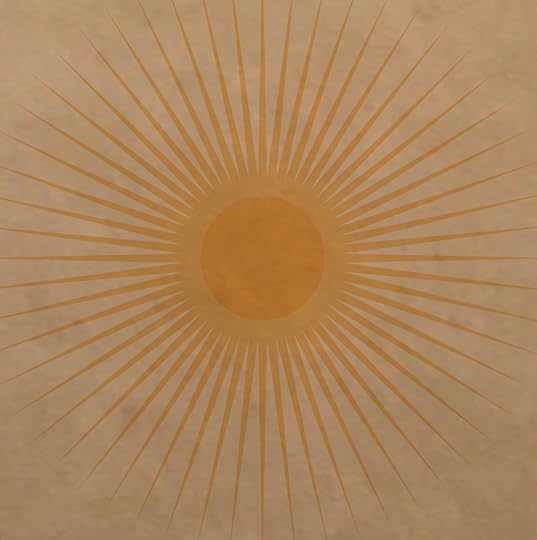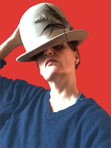Lulu Allison's Blog, page 2
June 10, 2022
A walk after rain
My shoes soaked
dark in fallen rain.
A little drop of sky
caught in wet ivy.
Qickening,
I at first mistake it
for the feather
of a jay.
A drop of sky beneath my feet
caught softly by the rain.
January 3, 2022
Fire starters and fuel gatherers
It’s the first Monday of the year and I’ve just had an idea I am hoping will become one of the links between writing and art making that I spoke of in my last post. Through my Middle Distance Arts group, I am going to start an art and writing (and scribbling/sketching/jotting/thinking) journal. I am going to invite anyone and everyone to join me, to dip in and out or fully immerse. I will post prompts each week and invite you to share where the prompt took you.
I haven’t worked out all the parameters, just that it will be ongoing. Perhaps for the year. I am setting it out in this unfinished way because it is the first Monday of the year, and that must be a time for beginning and so I want to propose it before the day is gone.
The title of this post is because in art and writing any little scrap can start an idea. Discarded thoughts will fuel a future idea. The act of being creative is both ignition and fuel. Even when we don’t yet know what for.
Why not join me? Use a dedicated notebook or sketchbook or pick up an old envelope if and when the mood takes you. If you feel the need to invest in your inventive mind, get a blank book, notebook or sketchbook, and commit to having a go at each of the prompts. Or you could focus either on picture making or writing. No one need see the results.
But remember, crucially, there is no such thing as wrong work, bad work, inadequate work in a sketch book or notebook.
So if you would like to share what you came up with, you can do so on social media using the hashtag #MDAfirestarters. (MDA stands for Middle Distance Arts) on instagram, twitter or facebook.
I have dug out a part-used but emptied A6 notebook that I will be using as my journal. Later I will post what I did in response to the following prompts.
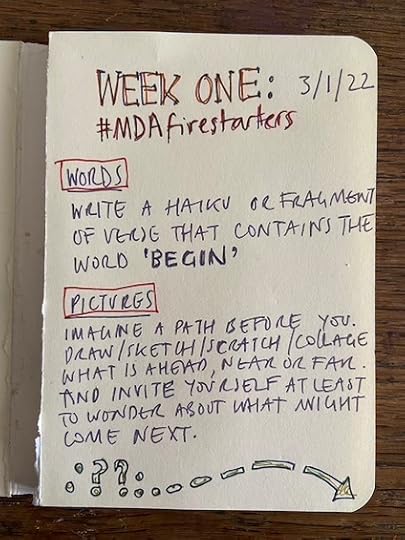
Week ONE, #MDAfirestarters
The first prompts for 2022 are:
Words: Write a haiku, or fragment of verse that contains the word ‘begin’.
Pictures: Imagine you are standing at the beginning of a path and draw/sketch/scratch out something, or all, of what you can see ahead. Is it in the distance or a few paces away? (And then of course, you have to at least wonder about what might come next!) You can try over many pages or just one. You can persevere or start again. You can draw, paint, or use printed or found images to collage. You can use colour to create the abstract sense of a mood instead of an object or view. You can cut widows, fold pages, add layers – or you can simply sketch vague shapes and write a note of what you are seeing. It’s your journal.
The words and images can work together or be separate.
If you feel shy about writing, drawing or picture making, try to be brave enough to give it a go – creative activity is for everyone and by doing you will learn.
And if the fire catches, if the embers spark, take it onto the lap top, the canvas, the installation and keep going. But rest assured that just by trying you have fed your imaginative mind, and that is never a waste of time. It’s soul food.
December 30, 2021
Some Place Between Nature and Civilisation
I went to the beach today, to breath, to be outside and, because it has been windy, to find driftwood. I use it to make things that I sell; mermaids, shrines, curious objects. It was low tide, the winds of the last few days had churned up a beautiful curd of sea trash and treasure. Red seaweeds, cuttlefish and sea purses, spectacles, rope and shoes. All spiked with bleak and battered seagull feathers that seemed to pin this knotted brocade of natural and human leavings along the beach. There was a good selection of driftwood for me to turn into mermaid’s tails.
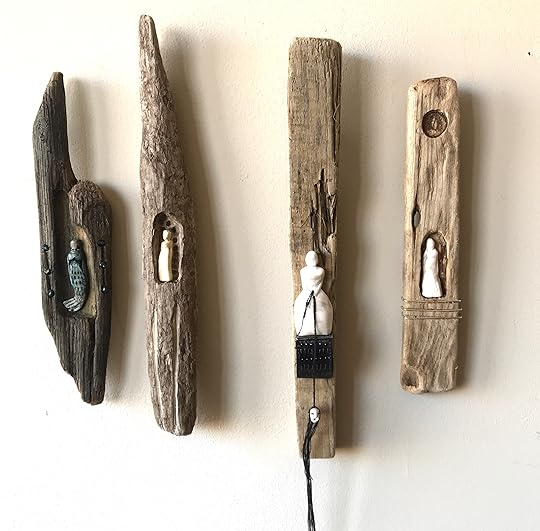
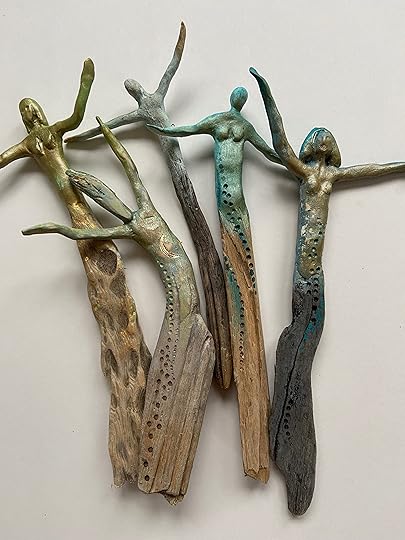
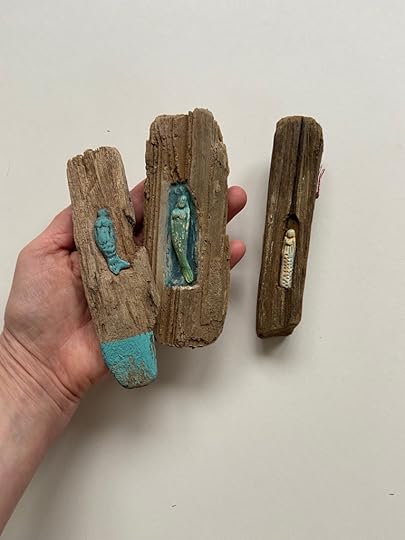 Some of my driftwood work
Some of my driftwood workI found this wonderful remain. Part of a boat, or a piece of furniture. Broken up and all of the edges worn smooth by the battering of time spent in the sea. I often wonder how long that relentless rounding off and wearing away takes. Some of the wood I work on is as soft as fudge, other bits, even worn to the roundness of pebbles, blunt my tools.
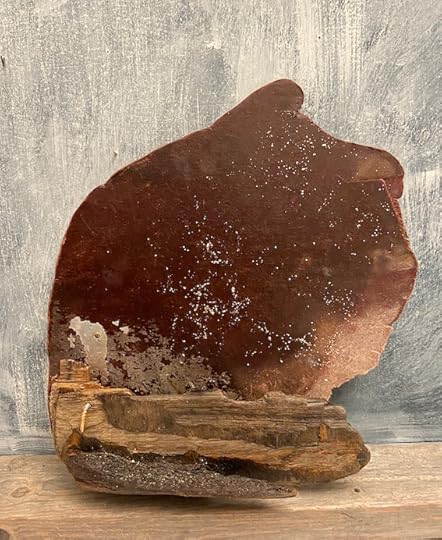
Looking at this object, clearly man made but worn out of recognition, into a new and beautiful shape by months or years at sea, I was reminded of one of my favourite quotes, from nature writer, Barry Lopez:
One of the great dreams of man must be to find some place between the extremes of nature and civilisation where it is possible to live without regret.
Barry Lopez, Crossing Open Ground
This is such a beautiful, precise expression of a profound dilemma. The need for people, the need for solitude. The desire for nature, the desire for culture. He encapsulates it so neatly and yet I think there must be swathes of literature, millions of words, based just on our wrestling with this push and pull. Indeed I realised that it had informed my writing of Salt Lick. Though the impetus to write was the belief that if we lose our connection to food and land we are sorely the lesser for it, I didn’t want to propose the simple equations of countryside + nature = good, cities = bad. Isolde, the central character has not had a happy life in the city. But though she finds peace, beauty, she is not easily won to the righteous collectivism she finds amongst the people in the country. And elsewhere the countryside is the new home of bitter nationalism, a white Englishness that festers out of the glare of scrutiny.
Isolde can’t help a dose of cynicism at the idea of returning to the land. Like there really is a way out from under the restrictive dominion of the city. And now, she sees the land as contaminated by the bleak hearts of the White Towners. She sees belief in the possibility as naiveté, a false cheer won by a refusal to look at the darkness. Her weary pessimism leaves her sad.
From Salt Lick
There is beauty too in the city’s wild spin. And what an incredible act of collaboration a city is. Really we could pat ourselves on the back for the sheer wonder of it.
Unable to sleep, she walks, out into the lulling business of the night. The city grits and rolls, like shingle. A clatter, constant enough to sooth – with a certain caution, as the waves can knock a person over, the multitude of stones can singly bruise. Not all the edges get taken off. The city hums. A miracle of collaboration. She sits on a bench in the park. Her shadow cast by the moon is kept company by two more, from dim sensor lights lining the path. No one made the moon, no hand, not a god or devil or angel put the moon together. The lights, everything about them other than that which names them – they are touched by so many hands. Metal dug and cast and recast and reclaimed and binned and sorted and finally cast one more time. So many men and women made that light.
From Salt Lick
Nature in the end is everything. But our nature is played out every day and is that of a human animal. Our nature is as builders, engineers, artists and problem solvers, collective wild ravers, as much as it is in being solitary souls cleansed by the wind on an empty beach, at one with the elements. It’s a puzzle, this human life of ours. One I am glad to say, needlessly, that I did not solve, or get close to wringing out in writing Salt Lick. There’s plenty more to find, to poke with a boot, to turn over, to collect up and bring home, or throw back into the sea. An endless current of understanding and mystery, sometimes thrown into fleeting clarity as the chance consequence of stormy weather and the drifting wash of the oceans.
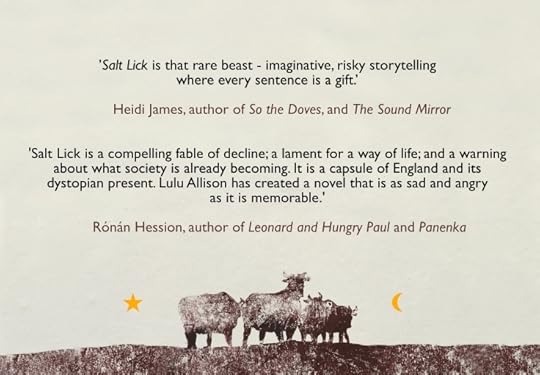
December 27, 2021
These beautiful, dull, damp days
One of the Christmas cards we received this year shows a panel from a Fra Angelico fresco, The Chorus of the Prophets. Sixteen figures with gold halos, cupid pouts or extravagant beards look down from discs of cloud that lift them above the chapel congregation. Each makes a gesture or carries a symbolic object. I don’t know why.

The lovely narrative strangeness of these early religious works is a benefit of my own ignorance. The symbolic gestures were at one time deliberately readable, as were the arrangements of figures, the colours of their clothing, the objects and animals tucked in with the people. Saints hold objects that name them as though each were displaying their very own pub sign. Keys mean St Peter, fingers in a wound, Thomas, an anchor, St Clement. I have to look all these up, and don’t know who the main players, guaranteed to be recognised by all when they were painted, would be. But for early church goers, familiarity with these symbols ensured the wall paintings would tell a story without the intercession of words, let alone google or wikipedia.
It was a happy choice of image to light upon. Earlier this morning I had been thinking about the two strands of my work, writing and teaching art. When I was an erratic, stimulus-seeking youngster I hated this time of year. The Christmas high already spent, the wild abandon of New Year’s Eve fully days away – it felt a kind of torture. Now I love it. The luxury of boredom, the absence of urgency. These are states that I long for year round but rarely manage to secure. Like many in the arts, making a living from precarious practises and unreliable sources, being self employed feels like a constant state of shoring up, of capitalising, of castigating oneself for failing once again to capitalise. I have freedom to live a creative life, and that is a great blessing. But I pay for it in security and an inability to do anything, however enjoyable and necessary some of it may feel to my soul, that is not work.
So, early this morning I was thinking about how my ambition for 2022 must be to make some of it feel like today. A dampening of the scrabble of practical thinking for long enough to get bored. The sporadic muting of tedious attempts to become something other than precariously rewarded. One thing I know now about writing is that I need time. Time to notice, time to change direction, time to rethink, or reshape. Time to spot a rich possibility, snuck in like a burred seed on the hem of another idea. I believe that this time must come without words – within a kind of precious and productive boredom. And writing being the thing I most care about, finding that time is important.
This morning I realised that the two strands of art and writing belong more closely together. Perhaps a delta of tributaries within the one practice, rather than two separate streams that both need banking, scoring, damming, clearing, fishing, nurturing, watching. Both are essentially a form of observation, and a reaction to and reshaping of what has been observed. Both, whether the notion of narrative is in fashion or favour or rejected, are a type of story telling. The need for time is in effect the act of creating a practice within which to produce work. It applies to both art and writing.
I don’t quite know how this will work, as predominantly my art practise now is one of online teaching, but picking up the card with its pyramid of prophets this morning seemed appropriate. These pictures were the writing of their day. They told stories for people who couldn’t read.
Whether using words or pictures we are sharing stories. It could be the story of an investigation into material, or a description of memory, a passing interest in the curl of a winter leaf or a habitual exploration of the wild array of shared myth.
Even if I can’t quite grasp the shape of it just now I am sure that removing the barrier between these two streams will enrich both, and leave me more beautiful, dull, damp, quiet time, and if I can let my head be quiet for long enough, I am sure it will work out how.
September 8, 2021
Letter to my MP
Bit of a random blog post but perhaps one of the topics I feel currently strongest about.
I despise this government. Sadly I’ve also given up my Labour party membership as their aims are not ambitious enough (I DO NOT have any energy for entering a Corbyn/Starmer debate. That is old, stale, overdone shit. That is too late now shit. That is ‘let’s stop fighting each other and get rid of the Tories PLEASE’ shit.)
Like many, due in part to our voting system, I feel politically homeless.
And this is where PR comes in.
When I was young my dad told me that the downside of PR is that the BNP (or NF, I guess, at the time) would have seats in parliament. I used to think that was a terrible thing and must be at all costs avoided. But really what would be wrong with giving the whole ‘silent majority’ schtick a little examination? A few MPs would serve to reveal the true, ‘noisy minority’ status of the far right.
The majority of people in this country vote for left-of-centre parties. That might not herald a route to the socialist haven of my dreams, but anything is better than what we are likely to be stuck with otherwise.
In Salt Lick, the government is an increasingly worse version of what we have right now. With the disenfranchising imposition of voter ID, the possible independence of Scotland, constituency boundary manipulation, it is not far-fetched to imagine an executive that already operates as though it is above the law, getting very much worse. Clearly, what they can get away with as opposed to what is in the interests of their constituents is the mode of governance.
If we had PR, there would be many changes. Some may not be perfect – visionary policy may be held in check by small majorities for example, but for christ’s sake, when is the last time we saw any visionary policies winging through the gothic architecture of Parliament? I’d settle for a collective decision that foodbanks and footballers are not the best way for one of the richest nations in the world to feed its children.
We are stuck with the two major parties fannying around to seduce the same, predictable but solid minority group of voters and placating the vile, reactionary rags they read. That leaves a hell of a lot of people unrepresented. Or vilified. At best, ignored.
In an era when politicians so rarely demonstrate they have earned the trust bestowed on them, perhaps a little reining in, a good deal of compromise and collaboration, might be what we need. Maybe collaboratively, a green new deal that will mean something might get off the ground.
Etc Etc.
The problem with politics is it is so BIG. I have plenty more arguments – I just don’t think I need to bore you all with them here. Instead, here is the letter I sent today today to my MP. It’s not necessarily the most stirring, best piece of letter writing, but it does feel necessary, so that there may be a little turning of the tide, and the slow accumulations may be enough, in the end, to float a very necessary lifeboat.
If you feel that you might like to do the same, here is a useful link. And please feel free to lift any of my letter if it would be useful.
Attn: Lloyd Russell-Moyle MP
Brighton, Kemptown
Wednesday 8 September 2021
Dear Lloyd Russell-Moyle,
I am writing to ask whether you will support the growing calls for a change in the voting system, at the forthcoming Labour conference.
Clearly our democracy needs rebalancing and our voting system needs to change, particularly if we are to avoid decades of Tory rule – truly a disaster for the country.
I canvassed for you in the last election, and would certainly consider doing so again – if Labour can step up to modernise, enfranchise and change our country so we are fit to tackle the many problems we face. This shameless Tory party will trickle relentlessly into government with its 37% of the vote, and sink us in poverty, shrinking life expectancy, climate disaster and sea level rises whilst some continue to enrich themselves.
The rest of the political body of the UK MUST step in. I hope that Labour can be at the vanguard, rather than languishing hopelessly in a wish to return to past (now impossible) successes.
Things must change. For all our sakes.
Yours sincerely,
Lulu Allison
August 23, 2021
Invitation to the Salt Lick online book launch
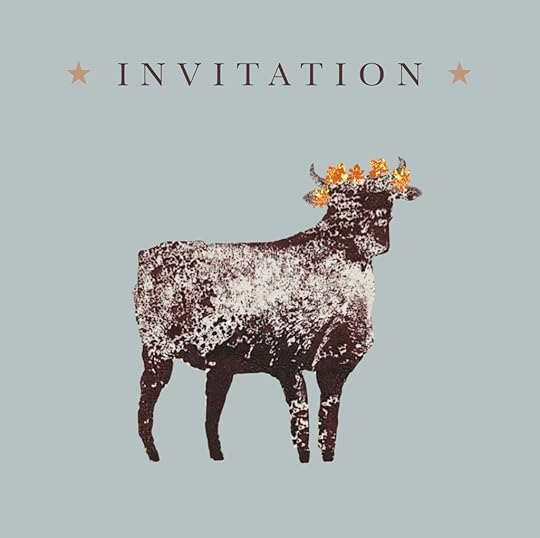
Please join me for the online launch of Salt Lick, on publication day, 16 September, 7.30 pm
To receive the Zoom link, register hereAt last something that began years ago, with a song about wild animals in a shopping mall and the idea of a man in prison imagining the inside of his body as a landscape of retreat, has become a book.
Many of you have helped Salt Lick come to life and I would love it if you could join me to celebrate. Everyone is welcome, the curious and supporters alike. You just need to register beforehand.
I would love to see you there.
If you don’t have a copy, there is still time to pre-order and enter the draw to win a portrait, painted from your chosen photograph of anyone you like. The winner will be announced at the launch. There will be other giveaways on the night too. I will be joined by the author Heidi James to talk about Salt Lick and answer questions about the book.
Thanks, and all the best,
From Lulu
August 12, 2021
Peace in the Valley Once Again
Who has thought about the songs for their funeral? This post is about one of mine.
I think about death often. I write this as I am wandering through one of my favourite places, Woodvale Cemetery in Brighton on England’s south coast. As I walk, I think about lost beloveds, mine across the world, and all the unknown people, beloved by others, around me here under the tangled trees and groundsel. I remind myself how natural a part of our life the end of it is. I think about death, as a means of getting out from under the anxiety of it.
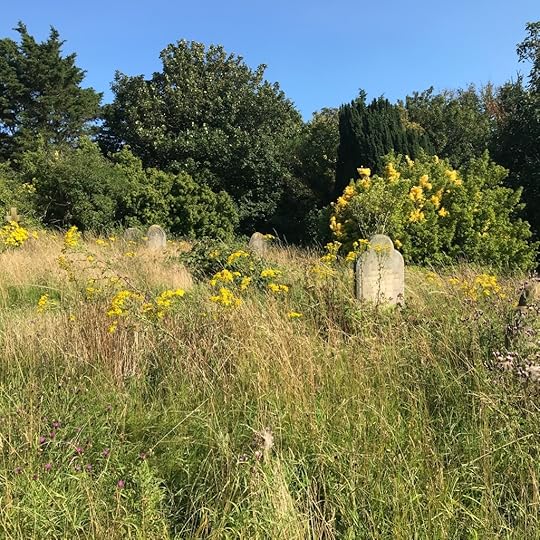 Woodvale Cemetary today as I wrote in my notebook
Woodvale Cemetary today as I wrote in my notebookOH MY GOD I’M GOING TO DIE ONE DAY… is one of the most powerful and useless thoughts in a human mind. Unless, that is, we shift the kind of power it has and allow ourselves to understand the rightness of it: accept our mortality and let it make us peaceful.
(Bereavement and grief are not things I am treating lightly in writing this. It is dreadful to lose a loved one. I am talking about our more general midnight mind and its grappling with our inevitable mortality, rather than specific deaths, which will always cause sometimes unbearable sorrow. I send love to anyone who is suffering with grief.)
I think about death by choosing songs I would like at my funeral, by walking in the beautiful cemetery; I think about death by choosing to acknowledge it. I recommend this process. I have found Going With Grace on Instagram a wonderful and life-enhancing help with this – a true and inspiring wise-woman.
But anxiety still creeps in. Because of the ravages of Covid and because we seem hell bent on killing the planet, this is a very anxious time. Many of us feel sad and scared about the future. The harms we wreak are more distressing to me than the knowledge of my own eventual end. We are so damn reckless.
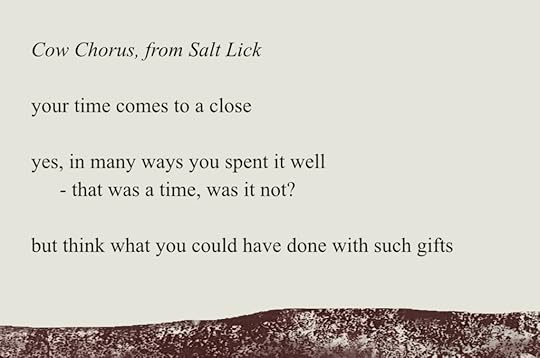 Part of the chorus, the herd voice of feral cows, who throughout Salt Lick, comment on the lives and choices of the people in the book, and the folly of all humans.
Part of the chorus, the herd voice of feral cows, who throughout Salt Lick, comment on the lives and choices of the people in the book, and the folly of all humans.But walking in Woodvale, to remind myself of the constant change of life and the blessing of being in it at all gives me comfort. A song gives me comfort – the song I would like played at my funeral. It reminds me that it is hubris to imagine that our end will be the end of everything. It reminds me that beautiful nature is more resilient, more wily, more profoundly powerful than we are. The natural world, though it be ever so battered and ill-used, will survive and flourish in new, unimaginable ways.
The song is Peace In The Valley Once Again by The Handsome Family. It was a huge inspiration in writing Salt Lick – the reason I wanted to imagine places where the scrubby tide of human occupation recedes and its leavings are slowly obliterated by nature. My fascination with this song lead me to imagine an England with no farms where wild cattle create a patchwork of woodland and meadow, to picture a woman walking under abandoned motorway intersections, a wolf, lying in the sun behind the crumbled cement of a brutalist multi-storey car park in Chelmsford.
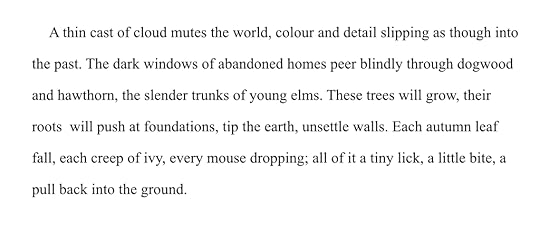 Quote from Salt Lick, as Isolde starts her journey on foot along the abandoned A12
Quote from Salt Lick, as Isolde starts her journey on foot along the abandoned A12I have always wanted to experience this landscape of ours without the choke and noise of cars; one of the great joys of writing is you get to design your own play parks and I loved writing Salt Lick. It imagines a world that is both frightening, as sea levels rise and human nature boils in the cities, and hopeful. Cars are abolished. People relearn ways to work, to co-operate, to grow food. It is not a dystopia but a mixture of muddling along, in bad and good, which is how I imagine all our possible futures.
To be clear, I don’t want to die unnecessarily, nor do I want people to be subject to the awful ravages of climate catastrophe. None of us I think, know if we will get it right. We are like inept and greedy mages, letting demons loose that we might gain gold plate on our tableware. It IS a catastrophe. One that takes more than a song to banish.
So sometimes we need comfort, a moment to regain our strength, to rest our minds. To make us ready for the next bit. To rediscover the simple blessing of being an animal, alive. I find a place of recuperation in this song as I step back from fearful reality and imagine wild horses breaking mirrors in the last shopping mall. It makes me think that somehow, somewhen, everything will be alright.
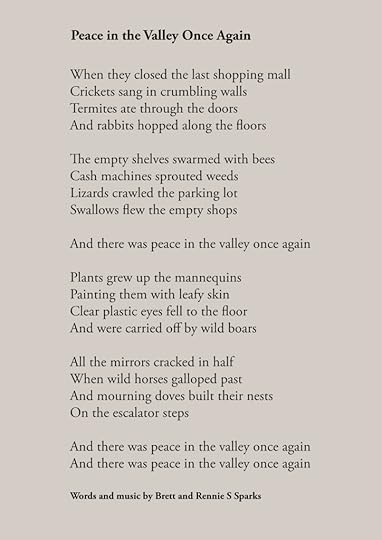 What a comfort
What a comfortI would like to thank Rennie Sparks of the Handsome Family for giving me permission to use the lyrics of her beautiful song.
August 7, 2021
hup, hup, whities, stop sitting on the defensive
If you are a writer, a reader, a poet, a book lover and you are on Twitter, the chances are you will have caught a row about an author called out for racist writing and the many people (of whiteness and establishment) who have stepped in to decry the accusation. People of colour have, with weary familiarity, scoffed as their concerns have once again been shut down, and once again the terribleness of the accusation of racism has trumped the terribleness of racism itself. It is the same appalling dynamic that protects a young man from a ruined reputation for the crime of sexual assault at the expense of the woman he assaulted. As a society, we are showing who we choose to protect.
Philip Pullman, no less, (an author who I’d hoped to admire) stepped in to defend the author, telling people they were ‘reading it wrong’. That is quite extraordinary.
It is all pretty horrible. I didn’t want it to happen because I admired the way this woman has in the past amplified and championed young diverse voices and that made me happy. But I read the quotes and they really do not sit right.
So, it did happen. This does happen. I am a Chelsea fan. John Terry was my hero. I had a football shirt with his name on the back. When he let his racist comments slip, I so wanted to find a way to explain it. I had invested so much in my admiration that I could not easily let go of it. I was tempted to resist or reinterpret, so as not to betray my investment. But not to accept that racism would be a bigger betrayal, of something much more important than my investment. And in the end of course, it doesn’t hurt that much, letting go of a bit of abstract, distant hero worship.
Racism, on the other hand, does hurt. It literally damages people; all of us, I believe, but mainly of course, those heavy with the burden of resisting and reacting and protecting themselves and their loved ones from the impact of it.
I do understand why the author in question has been so tender about this accusation. I understand because my book Salt Lick in some part (though by no means exclusively) deals with the racism of society. I have thought anxiously many times about how I should do this, and still am not sure I have got it right. But I did lots of thinking, I did some research and I tried my best.
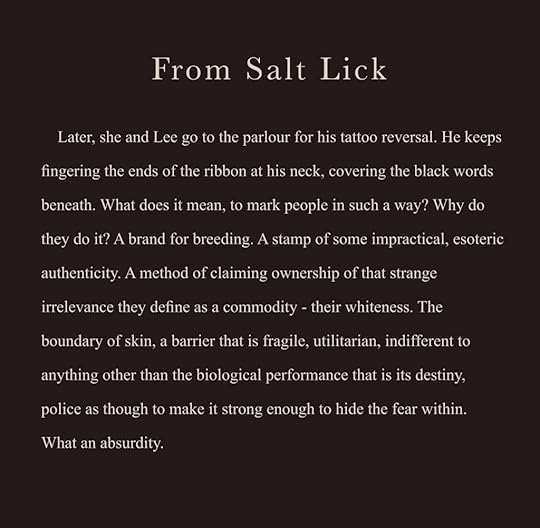
The main focus, what I was principally interested in was racism from the point of view of white people*; the frailty of those that hate another for their difference, our solipsistic ability to slide out from under the reality of it, our sense of embarrassed culpability. Because racism is a problem for white people in the same way that violence against women is a problem for men. Those on the receiving end should not be made solely responsible for the resolution of a problem caused by others. I have long understood that in relationship to misogyny and sexism, but it has taken longer to see in relationship to racism – that’s how it works, we see what affects us first.
We have to accept that our society is racist. There is a pay gap to prove it – such a simple illustration should need no other proof (though sadly there are proofs in abundance.) And if you don’t accept that as proof, presumably you believe in some kind of inherent difference, some kind of white superiority to explain it, in which case you have the nastier task of learning to accept your own racism. It’s one or the other.
Once we accept that, we have to also accept that we are, up to now, not expert at challenging it. After all, well meaning progressive white people such as myself have thus far done a pretty poor job of eradicating racism in our society. It’s almost as though our effort, our care, our KNOWLEDGE is not enough … No, of course it is not. Because being for most of our lives unaware of the impacts, we don’t inherently know, yet, how it works, and we certainly don’t know how to resolve it. So we should be able to listen, without challenging people to read a situation differently, without feeling hurt because we are GOOD.
I won’t deny it, if someone challenges the way I have written Salt Lick and calls it out for being insensitive, or god forbid, against any of my intentions, as racist, I am going to die a little inside. It will be painful, it will be a humiliation. But I will do my best, once again, to listen and to correct where possible, any hurt caused. Because how the hell could I know all about it? And why the hell would I not be satisfied with the patient explanation of what I have got wrong from people who, unfortunately for them, do know all about it?
Writers, think of it this way. Recently, I was horrified to learn the top ten cliche book openings, according to experienced agents. I thought it was kind of unfair, because, when you don’t read dozens of submissions a day, how do you know if you’ve fallen into a cliche? Well, you don’t. And being white, not subject to the relentless, common-place manifestations of racism (whatever other experiences of prejudice we may have faced, and there are usually some) how can we possibly find ourselves expert on how it works, the endless grind of it, how it expresses itself in the world? How can we possibly know more than our commrades of colour who have a life’s worth of experience? So, yes, if my book gets called out, however painful for me, it will be because I have made a mistake. It will be a mistake made in good faith but still it will be a mistake I will regret. So I will listen to those who tell me about it. Meanwhile, I hope people will find my book, set in an England further down the wrong path, thought provoking, and in the end, if we can listen, maybe even hopeful.
*There will be some who trot out the line about there being racism all over the world. That may be true, but we are here now, we are in a particular dynamic and so it was the racism of white people that interested me for a book set in England.
July 29, 2021
Rotten Turnips
“I don’t see any reason why you shouldn’t be out there in one of those fluorescent-jacketed chain gangs visibly paying your debt to society”.
Spite is a damaging emotion, burning both sides of its sour equation. Spite creates division. And god knows, division is not in short supply at this time. Johnson’s government are acting spitefully both to play to the fear and anger of a set of voters* and to measure out their own spite; there is a long list of people our government doesn’t like.
For some, this hi-viz shaming will signify strength. I think for a subset of those voters, callous disregard for others is an appalling kind of strength, born from a sense of superiority. Johnson himself seems the type. People with this entirely unlikeable entitlement to the good of the world are impervious to their own shame and fully at ease with hoarding that good unto themselves. It is for them a kind of mission statement.
Spite for lesser mortals is more often caused by a combination of fear and failure: a fear and /or dislike of others; the sense of one’s relative status as being inadequate; experiencing failure when success is necessary to assuage the anxiety of uncertainty. They probably would not perceive the reanimated Victorian corpse of Tory crime policy as spiteful, they would see shaming criminals with hi-viz-ability as justifiable revenge.
There’s no doubt that to be the victim of crime is frightening, awful, unfair. And to fear being the victim of crime can be nearly as bad. It is a fearful business, being on this planet. But though fear is the cause, it is in some ways not the problem. Fear turned to pre-emptive hate and suspicion is. Fear that acts in and of itself is.
Fear that privileges personal feelings over efficacy and decency is the problem.
Because if we ask what works to keep people safe from crime, high-viz jackets and other tools of shame don’t get near the top of the charts. If they did work we would not have needed to move on from stocks, symbolically cast in bronze in each crime-less town as a dread reminder of what happens if you stray. However much people feel in their angry hearts that it is right and just to shame criminals, experience and research shows that it does not work. Rehabilitation is a system that aims to lessen crime, not simply give lefty social workers (probably from North London if you want to go full gammon) a warm, fuzzy glow. Shaming people, unsurprisingly, rarely sends them back into the arms of their shamers, shedding touching tears of regret and the determination to be good from now on.
It’s ironic, that a government so devoid of the means to feel shame for its own actions can be so swift and sure in doling it out to others. (No doubt some Tory donor is rolling out a plan to franchise the sale of rotten vegetables to throw at the easy-to-spot gangs of litter-picking crims as we speak. Better add some prison arrows to the hi-viz jackets so the veg doesn’t accidentally get launched at some well-meaning community clear-up organised by the local church – oops!)
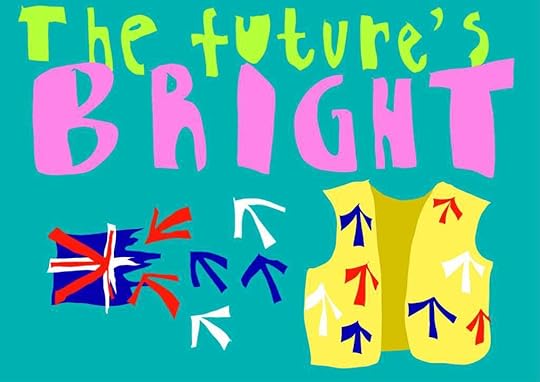
In Salt Lick, I used a pandemic (before we had a pandemic – cue swift additions to the finished text that more closely reflect a newly understood reality…) to create a time of uncertainty in which a right-wing government subtly but eventually, extremely, exerts control over the populace. I don’t doubt that given the chance, our current government is of the same brand; they would restrict, prune and shape our freedoms in any way that best served them. They are so filled with contempt for the people that they don’t even know it is contempt they feel. They are so shameless they don’t recognise the danger in these casual liberties that may well destroy the careful balance of the system that elevated them.
I have included two relevant extracts from Salt Lick below. It is both infuriating and grimly gratifying to see reality sloppily heading the same way as a book I invented. But by all means, let us stop it before it goes too far. (And by the way, it is still a hopeful book!)
If anyone deserves to go in the stocks it is (and if it were up to me I’d be glad to make an exception) the current prime minister. There’s no point in rehabilitation someone with so little to offer. Lord Ashcroft, how much for a pound of your best mouldy turnip?
*hashtagnotalltories
Excerpt from Salt Lick
The Restorations of Justice Act twisted into law out of the remains of two outmoded concepts – justice being seen to be done and the restorative power of connection between criminal and victim. Now, judges ruled behind closed doors; victims of crime, no longer able to take part in trials were instead given the right to observe the perpetrator imprisoned. As the statute book phrased it, they had the right not to participate in the dispensation of justice, but to observe the delivery of justice, by the state, on their behalf. The restorative qualities of the act had regressed, thuggish, to ancient and one-sided precedent – the spiteful power of being able to throw rotten vegetables at a criminal in the stocks.
People are not allowed to throw vegetables. But they are invited to observe the punishment, revel in it, if they wish. To take satisfaction, or a sense of justice, or pleasure from it.
Prisoners no longer merit the consideration of rehabilitation – so many of them will be incarcerated too long to consider them future citizens. The vast, automated prison complexes are geared to feeding a thirst for revenge; the infantilising bond between citizen and state strengthened by sharp doses of enemy-sharing.
That the death penalty had been once more abolished was down only to a lack of taste for further deaths after the annihilations of the pandemics a few decades previously. Combined with the frighteningly low birth rate even the most ruthless authoritarians had become squeamish about state execution. Criminal lives could be lived, until they died in prisons.
After the ravages of the October Night Flu there is a blurry hiatus. Individual miseries remain tattooed on the hearts of those left behind, but society is fed up with dread and worry. The state discovers a useful libertarian strand and the populace take as though born to the ways of the libertine. Why think about the declining birth rates? The deaths we still all feel? The tightening of control? The snip snip snipping away of freedom? Let’s cavort, cabaret, and let’s toast the we that remain. The state, a wily schemer, learns quickly that certain freedoms can stand in for others. Sure, party, take drugs, get high, who are we to stop you? The concessions are offered with insincere man of the world smiles: we share your appetites, who are we to judge? But slowly, quietly, stealthily, control is exerted. The internet is pruned. Soon it takes an espalier shape, dropping tight little fruits of uniform size and shape. The voices of those who notice, who rail, who warn, soon are only heard on street corners. The rest come to in the months and years after the second pandemic with a hangover, to find everything, once more has changed.
Salt Lick is available to pre-order from:
WaterstonesBlackwellsBookshop.org (supporting independent bookshops with online sales)All good independent bookshopsAmazonIf you do pre-order, you can enter a pretty awesome prize draw. Find out more here!
July 23, 2021
Becalmed
Or: How I think about writing my books, without words getting in the way
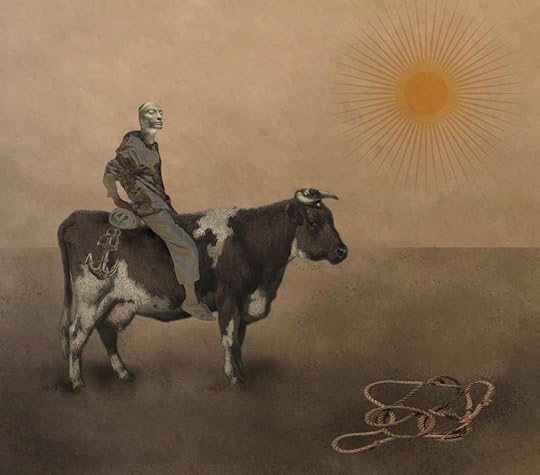
This is a picture of Isolde. Or at least a version of Isolde. She doesn’t ride a cow at any point in Salt Lick. Making pictures like this helps me write my novels. Not so I know what characters or places look like – this isn’t quite the Isolde of my mind’s eye. It is an impression of her. It helps me to think about my writing, without words getting in the way.
I often talk in my art classes about visual thinking. I can’t quote any science to clarify or prove this but it is for me a reasonable description of what happens when we make art: I loath the phrase ‘being in the zone’ but my guess is that something similar to what is meant by it happens when drawing or painting is going reasonably well. We are thinking, but wordlessly. We are thinking visually. There is clear intention and engagement, and the mental chatter is gone. It is precise, balanced; it feels viable and weightless. I don’t think it is The Zone of fantastical achievement and personal development goals (ugh) but it is a zone. The calm at the turn of the tide, perhaps.
It feels like respite, like a healthy state.
Words drive me round the bend. The roiling, relentless scrabble of them. I get so bored of the churning in my own head. Sometimes it feeling like a harm. Drawing and picture making bring respite, a wordless hiatus.
Perhaps writing too is a relief from the unruly flood. The chance to direct and shape words, to bank, channel and direct the flow. To paddle or swim (after all, I’m never going to drown in writing; only perhaps in the danger of expectations unmet, and the financial woes of working in the arts.) But sometimes it feels like words, on their own terms, could sweep me away.
It is difficult, writing a book. And though I know it is not perilous, it can feel awfully close to being impossible, to being something that will beat me. Perhaps because I no longer feel the desire (other than teaching) to make my career in visual art, picture making is a refuge and an ally, both for my writing mind and for my unoccupied and over-run mind that just wants to take a break.
I’m trying to learn meditation too … If a resource called Meditation for Impatient, Overthinking Idiots exists, send me a link.
if you are interested in my book Salt Lick as it nears publication on September 16th, why not sign up to my occasional newsletter? Your name will go into a prize draw to win another original piece of cow art. And you will be first to hear of other giveaways and prize draws on the way.
